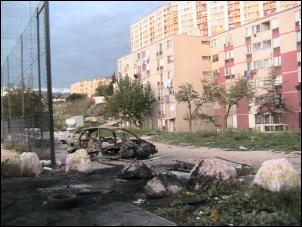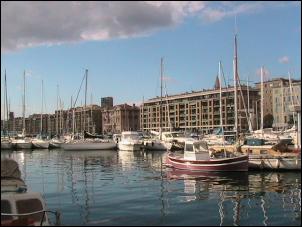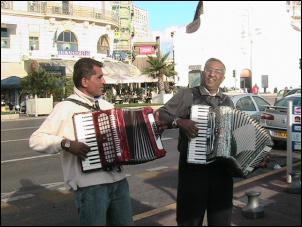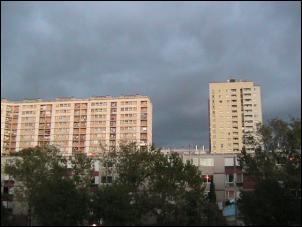Les Yeux on France: Why Marseille is Different
Les Yeux on France: Why Marseille is Different

![]() Scoop Audio: Click here to listen to this
edition of Les Yeux on France
Scoop Audio: Click here to listen to this
edition of Les Yeux on France
*******
A Molotov cocktail attack on bus 32 in Marseille’s 13th arrondissement on 28 October marked the anniversary of the beginning of the 2005 riot, during which marginalised youths vented their anger at the French state. The attack left a 26 year old student, Mama Galledou, in a critical condition, with burns on 62% of her skin. It occurred in the context of similar attacks on public transport and conflict with police in other parts of France. However, such acts of delinquency against the state in the Mediterranean port town of Marseille are not the norm. Les Yeux on France looks this week at what makes this city the exception in France.
(AIX-EN-PROVENCE – 7 November 2006) – A teenager on Liberation Boulevard wears a black t-shirt. The white lettering of ‘Paris’ is crossed out, replaced by red graffiti-like scrawl which reads ‘Marseille’. The port town, France’s second or third biggest city, depending on which classification you follow, is accustomed to being denigrated as France’s crime capital. Its inhabitants have a distinct identity and an equally strong accent. French here is influenced by the Provençal dialect and splattered with Corsican, Italian and Arabic words and expressions.

Its position as a major Mediterranean port has played a profound role in the evolution of the metropolis. This strategic importance was first utilised by the Ancient Greeks, who founded France’s first town here in 600 B.C. Ever since, Marseille has been a regional focal point for commercial enterprise.
Hundreds of thousands of ex-colonialists were repatriated here from Algeria in 1962. Equally, the city has long been the entry point for immigration from throughout the Mediterranean, and is characterised by the presence of many different peoples, notably from France’s former North African colonies, as well as from Corsica and Italy.

Far more cosmopolitan than Paris, Marseille was largely spared from outbreaks of violence during the November 2005 riots which spread like wildfire throughout almost every other urban centre in France with significant ghettos. Marseille was thus the exception, despite having an elevated unemployment rate (13%), a high proportion of ethnic minorities and a significant number of the 1960s housing estates (HLM) typically associated with ghettoisation. While poverty and crime are certainly pressing issues, a sense of being shunned by the state does not appear to be as strong here compared to that which exists in other urban centres across the nation.

Thus it seems that Marseillais immigrants and the children of immigrants feel generally happier with their lot than counterparts in other parts of France. They are generally more visible and integrated, and, according to some commentators, have been the benefactors of far more positive and proactive public initiatives. While the domineering HLM buildings proliferate, particularly to the north of the city centre, there is a sense that it is diversity which is the essence of Marseille’s identity. Rather than being segregated and made invisible, Marseille’s many ‘minorities’ have a sense of belonging; of being integral to the city’s vibrant culture.


 Ian Powell: A Timely Call For A Social Contract In Health
Ian Powell: A Timely Call For A Social Contract In Health Binoy Kampmark: Bratty Royal - Prince Harry And Bespoke Security Protection
Binoy Kampmark: Bratty Royal - Prince Harry And Bespoke Security Protection Keith Rankin: Make Deficits Great Again - Maintaining A Pragmatic Balance
Keith Rankin: Make Deficits Great Again - Maintaining A Pragmatic Balance Richard S. Ehrlich: China's Great Wall & Egypt's Pyramids
Richard S. Ehrlich: China's Great Wall & Egypt's Pyramids Gordon Campbell: On Surviving Trump’s Trip To La La Land
Gordon Campbell: On Surviving Trump’s Trip To La La Land Ramzy Baroud: Famine In Gaza - Will We Continue To Watch As Gaza Starves To Death?
Ramzy Baroud: Famine In Gaza - Will We Continue To Watch As Gaza Starves To Death?